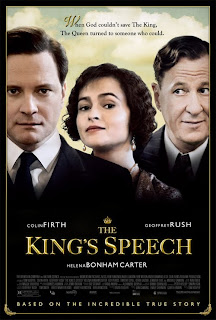The King's Speech
 The King's Speech is an impeccably made bit of crowd-pleasing, middlebrow entertainment, the cinematic equivalent of comfort food, albeit for the Anglophilic college graduate. That being said, I don't want to suggest that this in any way means it's not a smashing time at the movies. The King's Speech is not challenging, daring cinema, but for what it is it couldn't be much better.
The King's Speech is an impeccably made bit of crowd-pleasing, middlebrow entertainment, the cinematic equivalent of comfort food, albeit for the Anglophilic college graduate. That being said, I don't want to suggest that this in any way means it's not a smashing time at the movies. The King's Speech is not challenging, daring cinema, but for what it is it couldn't be much better.At it's heart, The King's Speech is an old-fashioned buddy movie, odd-couple variety. One half is the Duke of York, second son to King George V, who is not expected to become king, and thankfully so, because he is afflicted with a stammer. On the other hand is Lionel Logue, an Australian immigrant and speech therapist, an eccentric who loves Shakespeare and has funny ideas about how to cure his patients.
After seeing several official, knighted doctors, the Duke (known as Bertie to his family), sees Logue, after his patient wife Elizabeth arranges it. Of course they are like chalk and cheese at first, as Logue insists on calling each other by first names (something the Duke does not care for). But of course Logue gets results, and soon they are working together well. But when Bertie's brother, who becomes king upon the death of their father, insists on marrying a divorced woman, a distinct no-no, the stakes are suddenly much higher.
I've noticed that many reviews of this film basically say that this film is much better than the critic expected. I suppose that's because it has all the trappings of a typical, Oscar-bait, Masterpiece Theater-type entertainment. It's exceedingly British, with all the costumes and sets that that entails. We have locations like Buckingham Palace, Westminster Abbey, and Balmoral, and the costumes, by Jenny Beavan, along with the muted photography by Danny Cohen, perfectly represent the 1930s time period. But what kicks this film up a notch is the human emotion that bubbles to the surface. I credit this to a perceptive script by Danny Seidler, and two first-class performances, by Colin Firth as Bertie and Geoffrey Rush as Logue.
The role of Bertie is an actor's dream--one must get the speech impediment, and then not let that overwhelm the character. Firth, who might as well compose his Oscar speech now, manages that in spades. He is a prickly fellow, given to snapping (he says a temper is one of his many faults). The psychology of the character is glibly presented--Rush seemingly manages to get to his problem in five minutes of conversation (it was a mean nanny and an overbearing father, you see), but if one overlooks the Psychology 101 aspects, the humanity of a man who has the world on his shoulders is beautifully displayed.
Rush has an easier part, technically. He has all the good lines and the audience instantly likes him--we all like the man who does things differently (there's a great moment near the end when he sits in King Edward's chair--the one where British monarchs are crowned, and says "I don't care how many assholes have sat in this chair"). But Rush, given some shading by Seidler's script, brings the man to life more than one might expect. We get a key scene when he auditions for Richard III at a local theater group and is basically insulted for being too old and too Australian. His scenes at home with his wife (Jennifer Ehle) and sons also are well used.
The third piece in this film is Helena Bonham Carter as Elizabeth. It is perhaps understandable that this woman, who lived to be 102 and was beloved by the public, is portrayed as the epitome of British stiff upper-lip (it brings to mind Hitler's quote, that she was "the most dangerous woman in Europe," based on her popularity and usefulness in propaganda). If the role isn't exactly completely developed, Bonham Carter is eminently likeable in the role.
Also making small but effective appearances are Michael Gambon as the old king, Guy Pearce as David (who would briefly be Edward VIII), and Derek Jacobi as the Archbishop of Canterbury. The abdicated king, who would later be Duke of Windsor, is a largely reviled figure in history, but Pearce, along with the script, cuts him some slack (there are a few veiled references to his Nazi appeasement).
The film climaxes with an audacious move--Firth gives, in its entirety, the speech that King George gave on the occasion of declaring war on Germany. It's well over five minutes, and Tom Hooper, who directs, manages to invest the scene with a great deal of well-earned pathos. I must admit that while I was sitting there, thinking how it was all extremely sentimental, that I found I was also very moved.
My grade for The King's Speech: A-.


Comments
Post a Comment